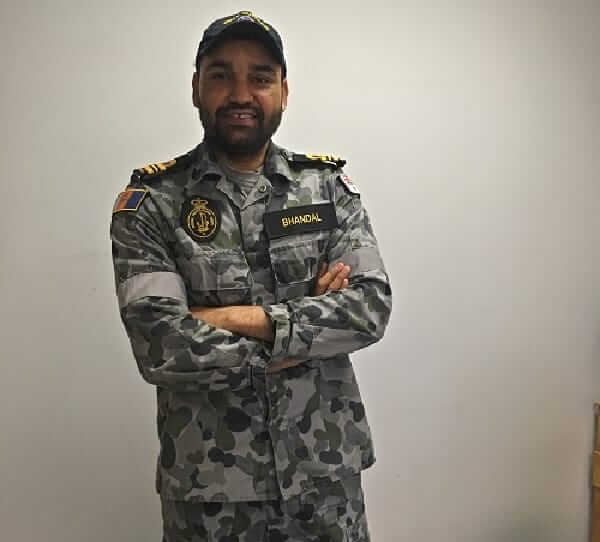My job title
Weapons Electrical Engineer. I hold the rank of Lieutenant Commander
I have been in this job for
Eleven years
My education
I came to Australia as a student aged 23. I’d completed an undergraduate degree in India, and was interested in studying Microelectronics Engineering.

RMIT in Melbourne had a good course and I felt Australia would offer me great opportunities to pursue my career ambitions. While at university I met and befriended a group of students from the Navy.
They had a real sense of mateship, community and were able to share what life in the Navy was really like. I loved the sense of camaraderie that existed between them. I decided to join. I have a bit of family history of service; my grandfather had served in the Army.
Since joining the Navy, I have further completed a Masters in Systems Engineering, funded by the Navy. I am currently undertaking a Masters degree in Reliability Engineering, through the University of Maryland, funded by the Australian Defence Force.
What my job entails
I have been a Weapons Electrical Engineer in the Navy for the past 11 years. When I am out at sea, I have responsibility for the weapons, combat system, sensors and communications equipment on the warship.
A career highlight to date has been acting as Head of Department for Weapons Electrical Engineering on a Major Fleet Unit, HMAS Ballarat, whilst on deployment.

I’ve also been part of exercises with the Singaporean and Malaysian Navies.
Three months deployment on Operation Sovereign Borders was hugely memorable, not only for protecting our nation’s borders and our maritime interests but also for the human element involved.
Life at sea can be challenging – you’re living in close proximity to lots of other people (180 on HMAS Ballarat, for instance), and the workload is intense, but it is wonderfully rewarding at the end of the day.
When I am ashore, I am involved in various system engineering roles during my two-year posting tenures. Currently I am manager of AMPS (Asset Management and Planning Systems) Assurance Cell, maintaining systems and providing advice. My team ensures that AMPS is technically fit for use in the fleet. We are involved in training the users, ensuring that the system is used correctly, and provide advice on all aspects of AMPS to various stakeholders.
What’s hard about my job
As with everything else, the communications aspect is always a challenge, coordinating various stakeholders to deliver good and acceptable AMPS.
The positive aspects…
There’s a sense of accomplishment. I feel that the work I do makes a difference to the Navy’s operations. I love the technical aspects of the job – I enjoy playing with systems and presenting to those higher up, new and better ways to help our processes.
Being in the Navy, I get to travel a fair bit. With two deployments in 2008-09 and 2012-14, I have seen South East Asia and New Zealand quite extensively. In 2008-09, I was in Tonga as part of the King’s coronation; that was memorable.
I’m also very proud of the sense of belonging that I’ve experienced. There are people from diverse backgrounds and we’re all made to feel at home. It’s a level playing field. I think the ADF is more accommodating of diversity than the civilian world.
People are valued for their contributions and the work they do, not judged by their appearance or where they have come from.
There’s job security as well, and a sense of respect from the community. That’s particularly true of my own (Indian) community: there’s high regard for the job.
How the job has changed my life
The Navy is not just a job – it’s a way of life. This lifestyle has seeped into my personal life in a major way. Small things like being punctual and being organised, or bigger things like helping others out, have made a big impact on my life.
In many ways, the Navy culture aligns with my own Sikh culture: both are about discipline, and the concept of ‘seva’ (helping others).
Advice for people who may want to get into this line of work
It’s a great career. There are wonderful opportunities to do things that you wouldn’t be able to do easily in civilian roles. You can progress your career well too.




